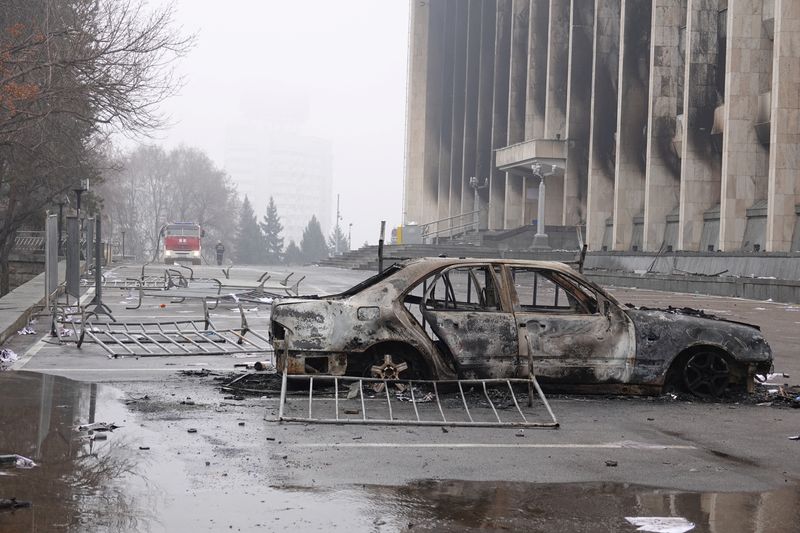(Reuters) - Dozens of people have died and thousands have been detained in Kazakhstan over the past week during the worst violence seen in the Central Asian nation since it became independent in the early 1990s.
Security forces appeared to have reclaimed the streets of the country's main city on Friday, a day after Russian paratroopers arrived to help quash the uprising.
Here is a snapshot of Kazakhstan, its economy and political system.
WHERE IS KAZAKHSTAN AND WHY DOES IT MATTER?
Kazakhstan, located between Russia and China and also sharing borders with three other ex-Soviet republics, is the largest economy in Central Asia, with rich hydrocarbon and metal deposits. It has attracted hundreds of billions of dollars in foreign investment since becoming independent in 1991.
Strategically, it links the large and fast-growing markets of China and South Asia with those of Russia and Europe by road, rail, and a port on the Caspian Sea. It has described itself as the buckle in China's huge 'Belt and Road' trade project.
Kazakhstan is the top global producer of uranium and this week's unrest prompted an 8% jump in the price of the metal that fuels nuclear power plants. It is the world's ninth biggest oil exporter, producing some 85.7 million tonnes in 2021, and its 10th largest producer of coal.
It is also the world's second largest miner of bitcoin after the United States. Bitcoin's "hashrate" - the measure of computing power of machines plugged into its network - dropped by over 10% on Wednesday after Kazakhstan's internet was shut off, according to crypto mining firm BTC.com.
WHY ARE PEOPLE ANGRY?
The uprising began as protests in oil-rich western regions against the removal of state price caps on New Year's Day for butane and propane, which are often referred to as 'road fuels for the poor' due to their low cost.
The reform, aimed at easing oil shortages, quickly backfired as prices more than doubled. The protests spread, tapping into a wider sense of discontent over endemic state corruption, income inequality and economic hardships that have all been compounded by the coronavirus pandemic.
Although the richest of the Central Asian republics in per capita income, half of the population in Kazakhstan - the world's ninth largest country by territory - live in rural, often isolated communities with poor access to public services.
While the country's vast natural resources have made a small elite incredibly wealthy, many ordinary Kazakhs feel left behind. About a million people out of a total population of 19 million are estimated to live below the poverty line.
Annual inflation is running at close to 9%, the highest in more than five years, prompting the central bank to hike interest rates to 9.75%.
WHO IS IN CHARGE?
Career diplomat Kassym-Jomart Tokayev, 68, was elected president in 2019 on promises to continue the broadly pro-business policies of his long-serving predecessor, Nursultan Nazarbayev. But Nazarbayev, a former Soviet Politburo member who led Kazakhstan for nearly three decades, was widely seen as the real power behind the throne.
Tokayev has used the protests - which have sometimes targeted symbols of the Nazarbayev era including statues - to fire the 81-year-old former president from his post as chief of the powerful Security Council.
Nazarbayev has made no public comments or appearances since the protests erupted and it remains unclear to what extent the uprising will weaken the considerable influence he and his family have continued to wield in politics and business.
Tokayev also sacked Nazarbayev's nephew, Samat Abish, as second-in-command of the security police. Nazarbayev's eldest daughter Dariga, a former speaker of the Senate and still a lawmaker, has been spoken of in the past as a possible future president.
ECONOMIC PROSPECTS
Kazakhstan’s per capita gross domestic product in 2020 was $9,122, World Bank data show, slightly above that of Turkey and Mexico but below its annual peak of nearly $14,000 in 2013.
Tokayev's government introduced a stimulus package worth 6% of national output to help smaller and medium-sized businesses weather the COVID-19 pandemic.
The World Bank has forecast economic growth of 3.5% in 2021, rising to 3.7% this year and 4.8% in 2023. It has urged Kazakhstan to boost competition and limit the role of large state-owned enterprises in the economy, tackle social inequality and create a more level economic playing field.
HUMAN RIGHTS AND FREEDOMS
Western countries and rights groups have long criticised Kazakhstan for its authoritarian political system, its intolerance of dissent, curbs on media freedoms and lack of free and fair elections, though it has also been viewed as less repressive and volatile than its ex-Soviet neighbours.

Amnesty International said this week's protests were a result of the authorities' "widespread repression of basic human rights" and it called for the release of all those arbitrarily detained and for investigations of past state abuses.
"For years, the government has relentlessly persecuted peaceful dissent, leaving the Kazakhstani people in a state of agitation and despair," said Marie Struthers, Amnesty's Director for Eastern Europe and Central Asia.